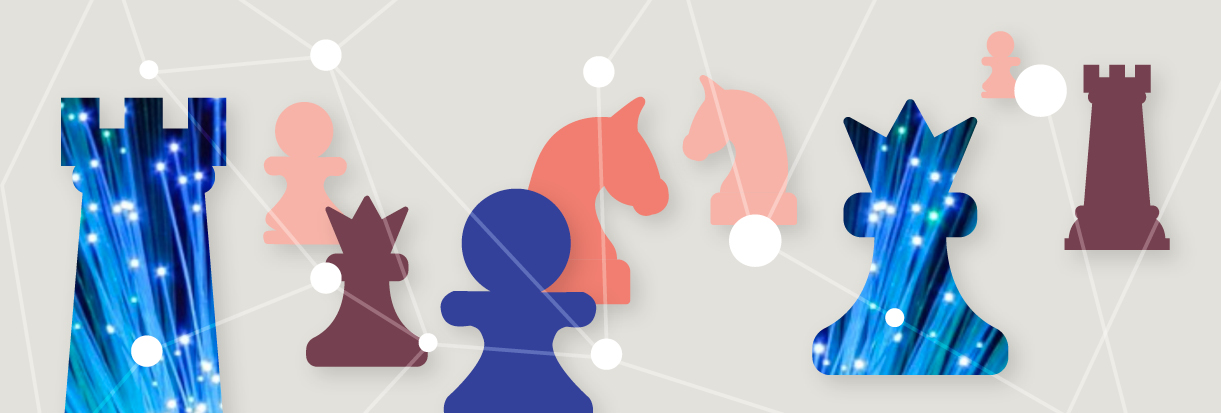Curriculum, Study Path and Content
The DSI Minor/LAO Digital Skills program is designed to run over two semesters, with the core modules starting each fall. However, you can also start the program in the spring semester and divide the modules over more than two semesters.
The curriculum design enables students to acquire digital skills based on their individual interests and previous learning paths and to gain an overview of the digital transformation. A core component is the application of these new competencies in a teamwork-based challenge that runs over both semesters.
All compulsory modules take place on Mondays in the DSI event room to foster a community of students, allow networking with our DSI researchers and simplify semester planning for students.
Overview of mandatory and elective modules
| Module Group | Mandatory (P) | Elective (W) |
|
Interdisciplinarity and Digital Transformation
|
Teamwork on Digital Transformation Challenges I & II (3 + 6 ECTS) Digital Transformation – A Scientific Overview (3 ECTS) |
Digital Transformation – An Artistic Reflection (3 ECTS) |
|
Programming, Machine Learning & AI (all mandatory modules)
|
Programming with Python (3 ECTS)* |
Programming Bootcamp (2 ECTS) Interdisciplinary Introduction to Machine Learning, Theory (3 ECTS) and Exercises (2 ECTS) |
|
Digital Skills & Tools |
None |
Open Source Intelligence (3 ECTS) UZH Innovathon (3 ECTS) ChatGPT and Beyond (2 ECTS) Storytelling for Digital Transformation (3 ECTS) For additional elective course options, please refer to the course catalogue. |
| Inter-/Transdisciplinary Competencies | None | Additionally, up to 3 ECTS can be freely selected from the entire range of courses offered by UZH, ETH, Una Europa and Global Student Experience |
| Total 30 ECTS | 15 ECTS | 15 ECTS |
|
|
||
Interdisciplinarity and Digital Transformation
In the compulsory module «Teamwork on Digital Transformation Challenges», students work in interdisciplinary teams on a challenge put forward by one of our DSI communities. In the process, the team integrates the domain knowledge from each member, the newly acquired ethical, legal and social knowledge, as well as digital skills. The latter will be acquired through skills modules (see below). The team’s goal for the Fall Semester (HS) is to present a well-considered and elaborated project plan, which is carried out in the Spring Semester (FS).
The compulsory module «Digital Transformation – a Scientific Overview» gives an overview of a broad range of topics and disciplines engaged in research on the digital transformation of society. The overview will be developed by reference to exemplary focus topics of current relevance.
In the elective module «Digital Transformation – an Artistic Reflection», students are encouraged to reflect on how to perceive and express the reality of digital transformation of society and are given time to create their own artistic work using mixed digital media.
Programming, Machine Learning & AI
Option A: Students without relevant coding skills are recommended to start with the «Programming Bootcamp», which takes place in the two weeks before the start of the Fall Semester (HS). This is to be continued with the compulsory module «Programming with Python». In the Spring Semester (FS), we recommend continuing with the «Interdisciplinary Introduction to Machine Learning (Theory & Exercises)». The modules offer theory and hands-on exercises from a variety of applications. Further practical skills modules can be chosen based on individual interests, previous learning paths, and skills that would benefit a successful challenge project.
Option B: Students who can demonstrate equivalent or higher Python skills from courses already completed may substitute the compulsory module «Programming with Python» with other courses from all module groups offered within the Digital Skills minor program.
Digital Skills & Tools
In this module group students can find offerings from all disciplines to expand on their digital skills.
Expand your horizons with electives from the School for Transdisciplinary Studies (STS)
Inter-/Transdisciplinary Competencies
We encourage students to enjoy the full range of courses offered by UZH, ETH, Una Europa, and Global Student Experience and to explore a field that is completely new to them. A total of 3 ECTS can be chosen freely.
Una Europa Module Exchange
Students can pursue a selection of modules from the Una Europa Module Exchange Program. The Una Europa Module Exchange is a virtual exchange of individual modules between four partner universities. It provides a flexible and easily accessible opportunity to participate in an international academic exchange.
Upon completing the modules successfully, the modules will be credited towards the DSI Minor/LAO program according to the table below.
| University | Module | ECTS | Module group |
|
University of Helsinki |
Engineering of Machine Learning Systems |
5 | Programming, Machine Learning & AI |
|
University of Helsinki |
AI in Society | 2-3 | Programming, Machine Learning & AI |
|
University of Bologna |
Data Science for Lawyers | 6 | Digital Skills & Tools |

.png)